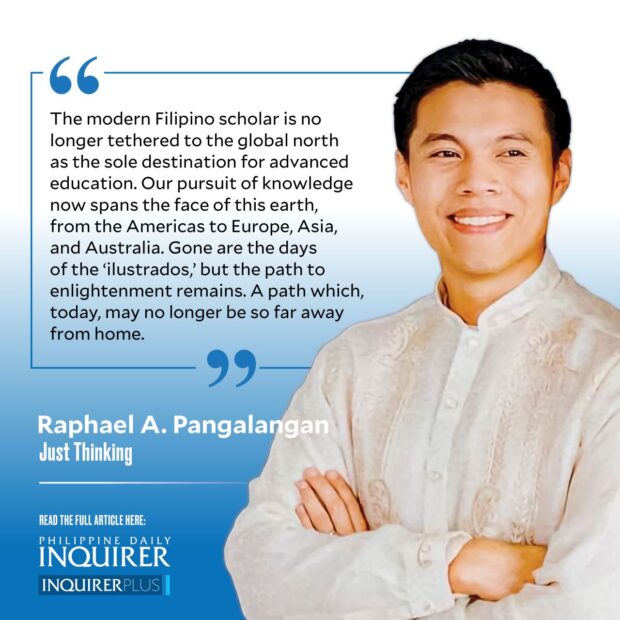Learning from the Orient

Filipinos have long looked to the West for enlightenment.
A casual stroll through our Hekasi (a Filipino shorthand for geography, history, and civics) textbooks takes us to the era of the “ilustrados.” The gente de razón. The intellectual elite. The Filipino few who, armed with knowledge acquired from Spanish academia, stoked the fires of revolution with ideals of liberty and equality. Yet, as the colonial baton passed from Spain to the United States, our collective gaze pivoted with it. The new titan of tyranny quickly became the object of our aspirations.
Article continues after this advertisementThe sprawling branches of my own family tree bear witness to this transition. Three generations ago, my great-grandfather, Dr. Homobono A. Aguiling, earned his doctorate in the bustling heart of New York in the 1920s. My grandfather, lawyer Ernesto P. Pangalangan, took his LL.M. at the University of Michigan as a Fulbright scholar, coincidentally sharing the alma mater with my wife’s grandfather, engineer Zoilo C. Lindo Jr. The subsequent generation, followed suit. My aunt, Dr. Grace H. Aguiling-Dalisay completed a fellowship in New York, while my uncle, Dr. Ernesto C. Pangalangan Jr.—an ophthalmologist and glaucoma specialist—completed his fellowship with Harvard Medical School. So did my parents complete their graduate studies in Harvard Law.
The narrative of that time was obvious: Education was a quest to the West.
But as they say: Times are a-changin’. The grand wheel of history is making its steady turn, and Filipino scholars find themselves drawn once again to Europe for further studies. This is a welcome change for various reasons. We are able to diversify views, and tap into a more egalitarian-orientated outlook common in Europe in contrast to the US. This shift diversifies the academic landscape, while also making higher education more accessible. The prohibitive tuition fees in the US require deep pockets, at times ranging from $50,000 to $100,000 per academic year. European tuition fees, however, are much more modest.
Article continues after this advertisementAs the associate dean for international partnerships of Jindal Global Law School (JGLS), I met with a delegation from Greece last month and learned that graduate degrees from the country’s top universities are available at a fraction of the cost, sometimes for as little as 1,000 euros per academic year. I ask: Why drain our coffers for the American Kool-Aid when the Pierian spring comes at a fraction of the cost or, better yet, tuition free?
Having had the privilege of studying and teaching at universities around the globe, I have seen for myself that the quality of education is neither confined to nor defined by the Ivy Leagues or the hallowed halls of Oxford, Cambridge, or Stanford. Indeed, as any honest graduate of these universities would admit, what difference these Tier-1 institutions lend to our records is not necessarily education but prestige. But in terms of the quality of education we receive, well suffice it to say that, with the oversupply of doctorates and expertise, products of these very “top-tier” universities are now teaching around the globe. Outside of the US and the United Kingdom, and in institutions which, though unranked, are specialists in their fields.
But that eastward trend should not end in Europe. We must also look to Asia.
Despite offers to continue my career path in Europe or the US, I chose to teach in the global south precisely to break away from Western-centric cycles. JGLS ranks among the top 100 law schools in the QS Global Rankings, while the University of the Philippines College of Law ranks in the top 300-350 in the world. Their impressive performances reflect a broader shift toward an education where members of the “third world” are not merely beneficiaries but significant contributors to global discourse. Clearly, there are lessons to be learned from the Orient too.
The modern Filipino scholar is no longer tethered to the global north as the sole destination for advanced education. Our pursuit of knowledge now spans the face of this earth, from the Americas to Europe, Asia, and Australia. Gone are the days of the “ilustrados,” but the path to enlightenment remains. A path which, today, may no longer be so far away from home.
















